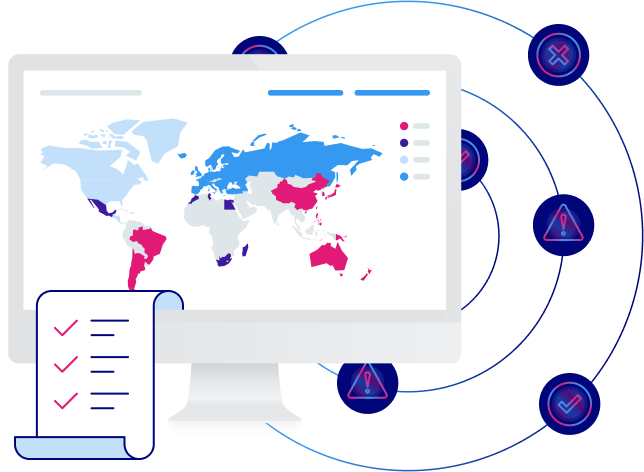-
Solutions
- AI Governance
- Geo-Specific Cookie Banner
- Consumer Preference Management
- Data Subject Request Automation
- Data Mapping and Vendor Risk Management
- Privacy, Vendor, and Risk Assessments
- Privacy Program Management
- Regulatory Guidance
- Privacy Program Consulting
- Certifications and Verifications
- International Data Transfers
Forrester TEI ROI of Privacy ReportTrustArc commissioned a Forrester study to analyze the potential benefits of using our platform and the Forrester team found ROI linked to efficiency, compliance, and decreased cost in data breaches.
Read the report -
Products Products Consent & Consumer Rights Overview
Experience automated privacy solutions that simplify compliance, minimize risk, and enhance customer trust across your digital landscape.
- Cookie Consent Manager Effortlessly manage cookie consent for global compliance, ensuring a secure, personalized browsing experience.
- Consent & Preference Manager Easily manage customer consent across brands and platforms—email, mobile, advertising—with a centralized repository.
- Individual Rights Manager Automate and streamline DSR workflows to ensure compliance and show your commitment to customer rights.
Products Privacy & Data Governance OverviewSimplify privacy management. Stay ahead of regulations. Ensure data governance with cutting-edge solutions.
- PrivacyCentral Centralize privacy tasks, automate your program, and seamlessly align with laws and regulations.
- Data Inventory Hub and Risk Profile Gain full visibility and control of your data and accurately identify and mitigate risks.
- Assessment Manager Automate and score privacy assessments like PIAs and AI Risk, streamlining your compliance workflow.
- Nymity Research Get instant access to the latest in privacy regulations, legal summaries, and operational templates.
Products Assurance & Certifications OverviewBoost brand trust with TRUSTe's certifications, showing your privacy commitment with the most recognizable seal, assessed by unbiased experts.
- Dispute Resolution
- TRUSTe Enterprise Privacy Certification
- TRUSTe EDAA Privacy Certification
- TRUSTe APEC CBPR and PRP Certification
- TRUSTe Data Collection Certification
- CCPA/CPRA Validation
- Data Privacy Framework Verification
- GDPR Validation
- Digital Advertising Alliance Validation
- Responsible AI Certification
-
Regulations
- EU General Data Protection Regulation (GDPR)
- California Consumer Privacy Act (CCPA)
- Virginia Consumer Data Protection Act (CDPA)
- NIST AI Framework
- ISO/IEC 27001
Data Privacy Framework (DPF)Transatlantic data transfer mechanism for EU-U.S., UK, and Swiss-U.S. commerce.
Learn more - Resources
- Contact us
Utah Consumer Privacy Act (UCPA)
The Utah Consumer Privacy Act grants Utah consumers the ability to control their data and imposes data privacy responsibilities on organizations handling their data. It outlines the obligations and privacy protection standards applicable to covered organizations.
Are you subject to the Utah Consumer Privacy Act?
The Utah Consumer Privacy Act applies to organizations who are (a) doing business in Utah or producing products or services targeted at Utah residents; (b) having annual revenue of $25,000,000 or more; and (c) meeting any of the following criteria:
-
During a calendar year, control or process personal information of 100,000 or more consumers.
-
Derive over 50% of gross revenue from the sale of personal information and control or process personal information of 25,000 or more consumers.
Obligations & rights under the Utah Consumer Privacy Act
This data privacy and protection law requires organizations to provide control and transparency to Utah residents on how their personal information is collected, sold, and disclosed.Consents & opt-outs
Organizations must obtain consent for the processing of personal information regarding a known child must comply with the verifiable parental consent mechanisms outlined in the federal Children’s Online Privacy Protection Act (COPPA), along with its implementing regulations and exemptions. Additionally, consumers must be provided the opportunity to opt out of targeted advertising, the sale of their personal information, and prior to processing their sensitive personal information.
Policies & motices
Organizations must provide consumers with a reasonably accessible and clear privacy notice that includes the categories of personal information collected and shared with third parties, the categories of third parties to whom the data is shared, the purposes of data processing, and the instructions for consumers to exercise their rights. Organizations that engage in the sale of personal information to third parties or process personal information for targeted advertising must ensure clear disclosure of these practices within their privacy notices. Additionally, they must outline the methods through which consumers can exercise their right to opt out of such activities.
Data subject rights & requests
Consumers are entitled to access, delete, opt out of processing, and exercise data portability rights. Organizations must respond to data subject requests within 45 days of receiving the request.
Vendor management
Under the Utah Consumer Privacy Act, organizations are required to execute vendor contracts that explicitly outline instructions for handling personal information, as well as describe the rights and responsibilities of all parties involved.

The Ins and Outs of the Utah Consumer Privacy Act
The Utah Consumer Privacy Act (UCPA) went into effect on December 31, 2023. There are many details including transparency requirements and consumer rights. Easily comply with our guide.
Achieve compliance
-
Protecting Personal or Sensitive Data Automate with TrustArc’s Data Inventory Hub. Save time and reduce risk with automated data flow mapping, risk analysis, and remediation for personal data processes and general activities associated for vendor management.
-
Mitigate risks Understand and mitigate risk with TrustArc’s Assessment Manager and Risk Profile. TrustArc’s AI-algorithm reviews specific risk variables, scores, and recommends necessary risk assessment (E.g. PIA or DPIA) for a mitigation plan. Use pre-built assessments and data mapping to map and track PI, SPI, and vendor risk.
-
Exercising individual rights Enjoy DSR automation with TrustArc’s Individual Rights Manager. Easily operationalize individual rights according to specific jurisdictions, leverage automated workflows to save time, and keep an audit trail of requests/actions.
-
Demonstrate CCPA compliance Identify gaps and track compliance with PrivacyCentral – assess regulation specifics and automatically get guidance on building out a sustainable privacy program.

The information provided does not, and is not intended to, constitute legal advice. Instead, all information, content, and materials presented are for general informational purposes only.




